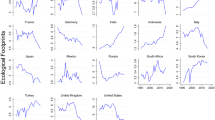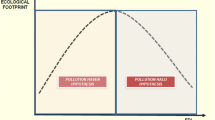Abstract
This study aims to investigate the validity of pollution haven hypothesis for the period from 1982 to 2013 in ten newly industrialized countries. For this purpose, we examine the relationship between real income, foreign direct investment, energy consumption, and ecological footprint using second-generation panel data methodology to take into account the cross-sectional dependence among newly industrialized countries. In doing so, the possible nonlinear relationship between foreign direct investment and environmental degradation is also searched. The results show that increased energy consumption and economic growth lead to increase in ecological footprint. Moreover, the U-shaped relationship between foreign direct investment and ecological footprint is confirmed in newly industrialized countries.
Similar content being viewed by others
References
Ahmed Z, Wang Z, Mahmood F, Hafeez M, Ali N (2019) Does globalization increase the ecological footprint? Empirical evidence from Malaysia. Environ Sci Pollut Res:1–18
Al-Mulali U (2012) Factors affecting CO2 emission in the Middle East: a panel data analysis. Energy 44(1):564–569
Al-mulali U, Tang CF (2013) Investigating the validity of pollution haven hypothesis in the gulf cooperation council (GCC) countries. Energy Policy 60:813–819
Baek J (2016) A new look at the FDI–income–energy–environment nexus: dynamic panel data analysis of ASEAN. Energy Policy 91:22–27
Bakhsh K, Rose S, Ali MF, Ahmad N, Shahbaz M (2017) Economic growth, CO2 emissions, renewable waste and FDI relation in Pakistan: New evidences from 3SLS. J Environ Manag 196:627–632
Baloch MA, Zhang J, Iqbal K, Iqbal Z (2019) The effect of financial development on ecological footprint in BRI countries: evidence from panel data estimation. Environ Sci Pollut Res 26(6):6199–6208
Behera SR, Dash DP (2017) The effect of urbanization, energy consumption, and foreign direct investment on the carbon dioxide emission in the SSEA (South and Southeast Asian) region. Renew Sust Energ Rev 70:96–106
Cole MA, Elliott RJ, Zhang J (2011) Growth, foreign direct investment, and the environment: evidence from Chinese cities. J Reg Sci 51(1):121–138
Destek MA, Ulucak R, Dogan E (2018) Analyzing the environmental Kuznets curve for the EU countries: the role of ecological footprint. Environ Sci Pollut Res 25(29):29387–29396
Fakher HA (2019) Investigating the determinant factors of environmental quality (based on ecological carbon footprint index). Environ Sci Pollut Res:1–16
He J (2006) Pollution haven hypothesis and environmental impacts of foreign direct investment: the case of industrial emission of sulfur dioxide (SO2) in Chinese provinces. Ecol Econ 60(1):228–245
Kirkulak B, Qiu B, Yin W (2011) The impact of FDI on air quality: evidence from China. Jrnl of Chinese Econ and Frgn Tr Studies 4(2):81–98
Kivyiro P, Arminen H (2014) Carbon dioxide emissions, energy consumption, economic growth, and foreign direct investment: causality analysis for Sub-Saharan Africa. Energy 74:595–606
Lau LS, Choong CK, Eng YK (2014) Investigation of the environmental Kuznets curve for carbon emissions in Malaysia: do foreign direct investment and trade matter? Energy Policy 68:490–497
Merican Y, Yusop Z, Noor ZM, Hook LS (2007) Foreign direct investment and pollution in five ASEAN nations. Int Jrnl of Econ and Man 1(2):245–261
Nunnenkamp P (2001). Foreign direct investment in developing countries: what policymakers should not do and what economists don’t know (No. 380). Kieler Diskussionsbeiträge.
Omri A, Nguyen DK, Rault C (2014) Causal interactions between CO2 emissions, FDI, and economic growth: evidence from dynamic simultaneous-equation models. Econ Model 42:382–389
Ozcan B, Apergis N, Shahbaz M (2018) A revisit of the environmental Kuznets curve hypothesis for Turkey: new evidence from bootstrap rolling window causality. Environ Sci Pollut Res 25(32):32381–32394
Ozturk I, Al-Mulali U, Saboori B (2016) Investigating the environmental Kuznets curve hypothesis: the role of tourism and ecological footprint. Environ Sci Pollut Res 23(2):1916–1928
Pao HT, Tsai CM (2011) Multivariate Granger causality between CO2 emissions, energy consumption, FDI (foreign direct investment) and GDP (gross domestic product): evidence from a panel of BRIC (Brazil, Russian Federation, India, and China) countries. Energy 36(1):685–693
Pedroni P (1999) Critical values for cointegration tests in heterogeneous panels with multiple regressors. Oxf Bull Econ Stat 61:653–670
Pesaran MH (2004) General diagnostic tests for cross section dependence in panels, Cambridge Working Papers in Economics 35 Faculty of Economics. University of Cambridge
Pesaran MH (2006) Estimation and inference in large heterogeneous panels with a multifactor error structure. Econometrica 74(4):967–1012
Pesaran MH (2007) A simple panel unit root test in the presence of cross-section dependence. J Appl Econ 22(2):265–312
Ren S, Yuan B, Ma X, Chen X (2014) International trade, FDI (foreign direct investment) and embodied CO2 emissions: a case study of Chinas industrial sectors. China Econ Rev 28:123–134
Shahbaz M, Nasreen S, Abbas F, Anis O (2015) Does foreign direct investment impede environmental quality in high-, middle-, and low-income countries? Energy Econ 51:275–287
Solarin SA, Al-Mulali U, Musah I, Ozturk I (2017) Investigating the pollution haven hypothesis in Ghana: an empirical investigation. Energy 124:706–719
Solarin SA, Al-Mulali U (2018) Influence of foreign direct investment on indicators of environmental degradation. Environ Sci Pollut Res 25(25):24845–24859
Sun C, Zhang F, Xu M (2017) Investigation of pollution haven hypothesis for China: an ARDL approach with breakpoint unit root tests. J Clean Prod 161:153–164
Tamazian A, Rao BB (2010) Do economic, financial and institutional developments matter for environmental degradation? Evidence from transitional economies. Energy Econ 32(1):137–145
Tang CF, Tan BW (2015) The impact of energy consumption, income and foreign direct investment on carbon dioxide emissions in Vietnam. Energy 79:447–454
Wackernagel M, Rees W (1998) Our ecological footprint: reducing human impact on the earth (No. 9). New Society Publishers
Wang DT, Chen WY (2014) Foreign direct investment, institutional development, and environmental externalities: evidence from China. J Environ Manag 135:81–90
Westerlund J (2007) Testing for error correction in panel data. Oxf Bull Econ Stat 69:709–748
Zakarya GY, Mostefa B, Abbes SM, Seghir GM (2015) Factors affecting CO2 emissions in the BRICS countries: a panel data analysis. Proc Econ and Fin 26:114–125
Zhang C, Zhou X (2016) Does foreign direct investment lead to lower CO2 emissions? Evidence from a regional analysis in China. Renew Sust Energ Rev 58:943–951
Zhu H, Duan L, Guo Y, Yu K (2016) The effects of FDI, economic growth and energy consumption on carbon emissions in ASEAN-5: evidence from panel quantile regression. Econ Model 58:237–248
Author information
Authors and Affiliations
Corresponding author
Additional information
Responsible editor: Philippe Garrigues
Publisher’s note
Springer Nature remains neutral with regard to jurisdictional claims in published maps and institutional affiliations.
Rights and permissions
About this article
Cite this article
Destek, M.A., Okumus, I. Does pollution haven hypothesis hold in newly industrialized countries? Evidence from ecological footprint. Environ Sci Pollut Res 26, 23689–23695 (2019). https://doi.org/10.1007/s11356-019-05614-z
Received:
Accepted:
Published:
Issue Date:
DOI: https://doi.org/10.1007/s11356-019-05614-z




